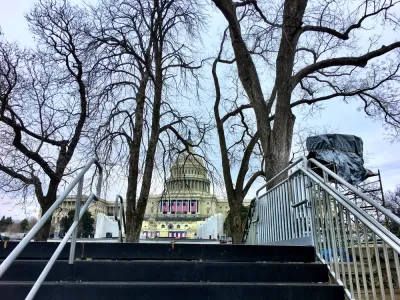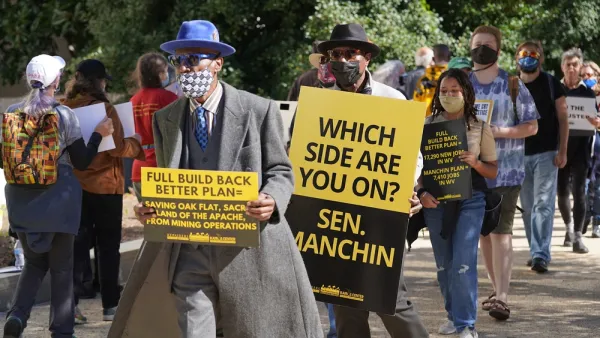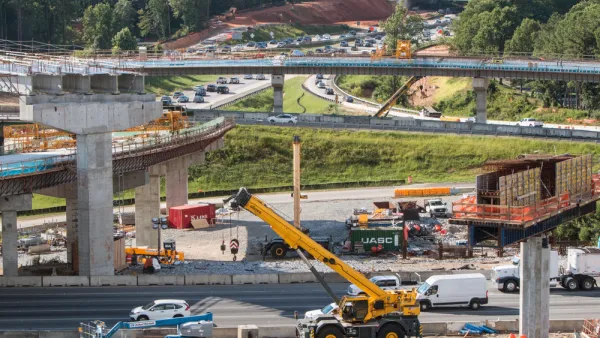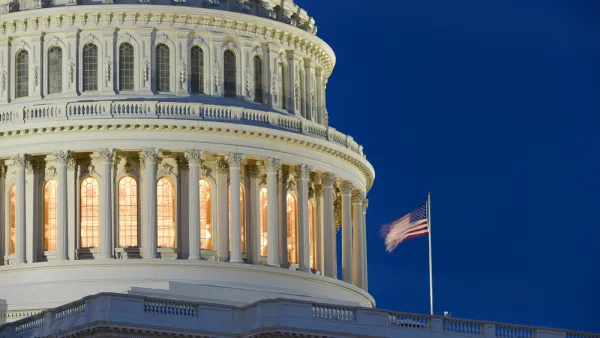A final vote of 69-30, with 19 Republicans joining their Democratic colleagues in the Senate, will send the Infrastructure Investment and Jobs Act to the House.

"The US Senate passed a historic, sweeping $1.2 trillion bipartisan package on Tuesday to shore up the nation’s crumbling infrastructure with funding for priorities like roads, bridges, rail, transit and the electric grid," report Ali Zaslav and Clare Foran.
The article also touts the bill as "a major achievement for both parties and President Joe Biden."
Here's how the article breaks down the $550 in new federal spending over five years included in the Infrastructure Investment and Jobs Act:
- $110 billion in roads, bridges, and major projects
- $66 billion in passenger and freight rail
- $65 billion to rebuild the electric grid
- $39 billion to modernize and expand transit systems
- $7.5 billion to build a national network of charging infrastructure for electric vehicles
- $55 billion for water infrastructure (including $15 billion for replacing lead pipes).
CNN's tally leaves more than $200 million of the total off the itemized list, however, and the actual sum of the investments in this bill have been something of a shell game for month now (it's a $1.2 trillion bill with $550 million in new spending, for example—the remaining total goes to current federal authorizations for public works, including highway spending). In the planning realm, pundits and advocates have disputed the extent of the bill's investments in the systems contributing to climate change for months now. Sam Mintz, transportation reporter for Politico took to Twitter to this morning to total the spending on highway programs at $303.5 billion, a 35 percent increase over current levels.
A separate article by Heather Long provides more detail and focus on the spending proposed by the Infrastructure Investment and Jobs Act.
Democratic officials—with at least some stake in the Biden administration's campaign pledge to "Build Back Better" by ending and reversing the well documented social and environmental consequences of the infrastructure and transportation status quo—have focused messaging on the smaller sums for ostensibly progressive causes, like the money for broadband, electric cars, and drinking water. Republicans are pointing to the money for bridges and roads and the permitting reforms included in the bill. The vote, and all of the statements, takes place just one day after the International Panel on Climate Change released a report offering proof of the "unequivocal" connections between human activities, like those enshrined by this bill, and quickly accelerating, catastrophic changes in the climate of the planet.
The Infrastructure Investment and Jobs Act will now head to the House of Representatives, which won't be able to take a vote until it returns from recess at the end of August. "Speaker Nancy Pelosi has indicated that the chamber won’t take up the bipartisan bill until Senate Democrats pass a separate and more expansive package without GOP votes under the budget reconciliation process, a stand that has been met with criticism from Republicans and pushback from some moderate Democrats," report Zaslav and Foran.
Additional reporting on the Senate's vote on the Infrastructure Investment and Jobs Act is available from NBC News and the Associated Press.

Analysis: Cybertruck Fatality Rate Far Exceeds That of Ford Pinto
The Tesla Cybertruck was recalled seven times last year.

National Parks Layoffs Will Cause Communities to Lose Billions
Thousands of essential park workers were laid off this week, just before the busy spring break season.

Retro-silient?: America’s First “Eco-burb,” The Woodlands Turns 50
A master-planned community north of Houston offers lessons on green infrastructure and resilient design, but falls short of its founder’s lofty affordability and walkability goals.

Test News Post 1
This is a summary

Analysis: Cybertruck Fatality Rate Far Exceeds That of Ford Pinto
The Tesla Cybertruck was recalled seven times last year.

Test News Headline 46
Test for the image on the front page.
Urban Design for Planners 1: Software Tools
This six-course series explores essential urban design concepts using open source software and equips planners with the tools they need to participate fully in the urban design process.
Planning for Universal Design
Learn the tools for implementing Universal Design in planning regulations.
EMC Planning Group, Inc.
Planetizen
Planetizen
Mpact (formerly Rail~Volution)
Great Falls Development Authority, Inc.
HUDs Office of Policy Development and Research
NYU Wagner Graduate School of Public Service





























